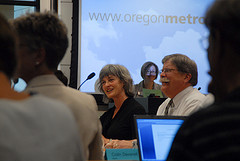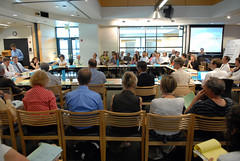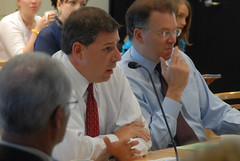Metro’s Joint Policy Advisory Committee on Transportation (JPACT) met this morning to set policy parameters on how to allocate $20-24 million in federal Metropolitan Transportation Improvement Plan dollars (MTIP) — also known as Regional Flexible Funds. After some tense discussion, the committee split 7-6 in favor of a motion to target 75% of the funds for active transportation projects and 25% for freight projects (after that contentious amendment passed, the committee unanimously passed the full resolution).
“No one wants this to be about bikes versus trucks… It shouldn’t be a debate, but unfortunately we have very little money to distribute so it ends up sounding like that.”
— Carlotta Collete, JPACT Chair
At the outset of the meeting, Chair Carlotta Collette tried to defuse what she knew would be a tense agenda item, urging the audience and JPACT members to not see this as a battle between bikes and trucks. “No one wants this to be about bikes versus trucks… It shouldn’t be a debate,” she said, “but unfortunately we have very little money to distribute so it ends up sounding like that.”
Collette emphasized repeatedly that this decision was just for spending in 2014-15. “This is not a lifelong commitment to spending our money this way.” Yet, despite her hopes, the discussion — and the vote — ended up coming down to bikes vs. freight.
Bill Wyatt, the executive director of the Port of Portland, began the discussion by amending his previous proposal to put 25% into the “Active Transportation/Complete Streets” project category and 75% in the “Green Economy/Freight Initiatives” category (that’s the proposal that mobilized bike advocates and sparked the debate). Wyatt then amended his own motion and put dollar amounts of $11 million for freight and $12 million for active transportation (about a 45/55 split).
Metro Councilor and JPACT member Kathryn Harrington was next to speak. Saying that “Metro is much more comfortable with a different split,” she put forward a counter amendment and proposed 75% for active transportation and 25% for freight (flipping Wyatt’s initial motion). A discussion followed.
Wyatt reminded the committee that freight was shut out of the last Flexible Fund allocation and also referred to a grim future funding picture for freight-friendly road modernization projects (ODOT’s Region 1 director Jason Tell shared at the outset of the meeting that there’s no budget for matching funds, key to leveraging big federal dollars). Wyatt opposed the motion put forward by Metro’s Harrington, saying, “Meager and pathetically small as this pile [of money] is, it’s a more important pool of resources today that it might have previously been.”
Washington County Commissioner Roy Rogers also opposed the motion on grounds that the region needs to do more to support businesses and the economy (which in this meeting came to be synonymous with freight). “Outside this room, there’s a recession going on… Frankly, if we want to keep this economy going… foreclosures are on the rise, we’re losing jobs, outside this room folks are having a difficult time… Anything that helps the business community we have to take a hard look at.”
“… The argument that there’s no other source of money [for active transportation] has really turned on its head.”
— Jason Tell, ODOT Region 1 Director
ODOT Region 1 Director Jason Tell rebutted the argument by active transportation advocates that this pot of money is crucial to biking and walking projects. “At one time that was true,” he said. To make his case, Tell said that since 2000 the money available for biking and walking projects is going to grow by 500%. On the other hand, with MTIP Flexible Funds set to only grow 50% in that same time period and with regional modernization budgets going to zero, he claimed that, “the argument that there’s no other source of money [for bike/ped] has really turned on its head.”
Speaking up for biking and walking projects, Metro Councilor Rex Burkholder disagreed with Tell’s analysis. “If you look at the large regional picture, we have a need for sidewalk and bikeways, this is one of the few areas we’re able to direct dollars to them… There are a lot of funds available for freight.”
City Commissioner Nick Fish, speaking as an alternate JPACT member in place of Portland Mayor Sam Adams, echoed Burkholder and said that while they understand that moving freight is a “key piece” of the regional transportation picture, “there are substantial pots of funding.. to address freight needs.” He then pointed out the stats we shared yesterday: From 1995-2010 the region has invested $4.2 Billion in roads, bridges and freight while investing a mere $153 million in biking and walking projects (and of that, 30% came from this MTIP pot).
Fish said, “When we invest in trails, there’s a huge return to the public.” He also expressed concern that any targets below 75/25 in favor of biking and walking would set a bad precedent. “We don’t think it’s time to back off that commitment.”
Steve Stuart, a Clark County Commissioner, offered memorable testimony in favor of the pro-biking and walking Metro motion. Stuart offered perspective, saying that “we’re fighting over budget dust” and that an impending Oregon request for the Columbia River Crossing project will be “$400 million for one freight project.”
Stuart added, “I prefer to support projects over process… The freight projects you can accomplish for this amount of money are things like ‘preparation’, ‘regional strategies’ and ‘freight development’ — these are processes you’d be paying for. You’re not going to get projects on the ground for that kind of money.” And for the politicians in the room, he offered this: “There’s no ribbon cutting for processes.”
Stuart said he recognizes the need for freight projects, but would rather fight for them in the big leagues of transportation funding, like through the legislature in Salem and on Capitol Hill.
When it came time to vote on the 75/25 active transportation/freight funding target, it was very close. 7 members were in favor, 6 were opposed, and 3 abstained. Here’s how the votes went:
YES
– Jack Burkman, Vancouver City Council Member
– Kathryn Harrington, Metro Councilor
– Rex Burkholder, Metro Councilor
– Neil McFarlane, TriMet GM
– Steve Stuart, Clark County Commissioner
– Nick Fish, Portland City Commissioner
– Deborah Kafoury, Multnomah County Commissioner
NO
– Bill Wyatt, Port of Portland – NO
– Craig Dirksen, Mayor of Tigard
– Jason Tell, ODOT Region 1 Director
– Roy Rogers, Washington County Commissioner
– Ann Lininger, Clackamas County Commissioner (“We absolutely support active transportation, but we are committed to support our businesses through this recession.” — Her No vote is interesting because she was representing fellow commissioner Lynn Peterson, one of the most staunch active transportation supporters in the region)
– Shirley Craddick, Gresham City Councilor
Now official, JPACT Chair Collette said the 75/25 funding allocation will not act as a hard and fast project spending split. From here, a single task force made up of freight and biking/walking advocates will sit down in the same room and try to agree on a project funding list. The 75/25 was referred to as merely “gentle guidance” for that group. (Interesting to note that initial plans were for separate bike/freight task forces to be assembled, but Chair Collette passed a motion to combine them into one.)
Another interesting note about this morning’s meeting was a motion that passed to set aside $500,000 “off the top” (a.k.a. an earmark) of these funds for an electric vehicle industry development project in Clackamas County. The motion was put forward by Commissioner Ann Lininger. Rex Burkholder was the sole vote in opposition. He seemed to be more perturbed by the nature of the motion more than the project itself. Given the bloody funding battles we’ve all become used to in the active transportation world, it was amazing to watch one committee member propose a $500,000 project earmark and than have it pass as law a few minutes later.
This vote offered a glimpse into battles to come for active transportation advocates — especially as budgets shrink and votes become more politically difficult in the future.
One last thing I took away from this meeting is the repeated inferences by Chair Collette that freight investments support the economy while on the other hand bike projects — by nature of the way she spoke about the two — do not. I realize bike advocates must do a better job making an economic case for bikeways and trails, but Collette should be more careful not to perpetuate freight as the economic choice.
If you thought this was interesting, wait until they start trying to select projects. Stay tuned.




